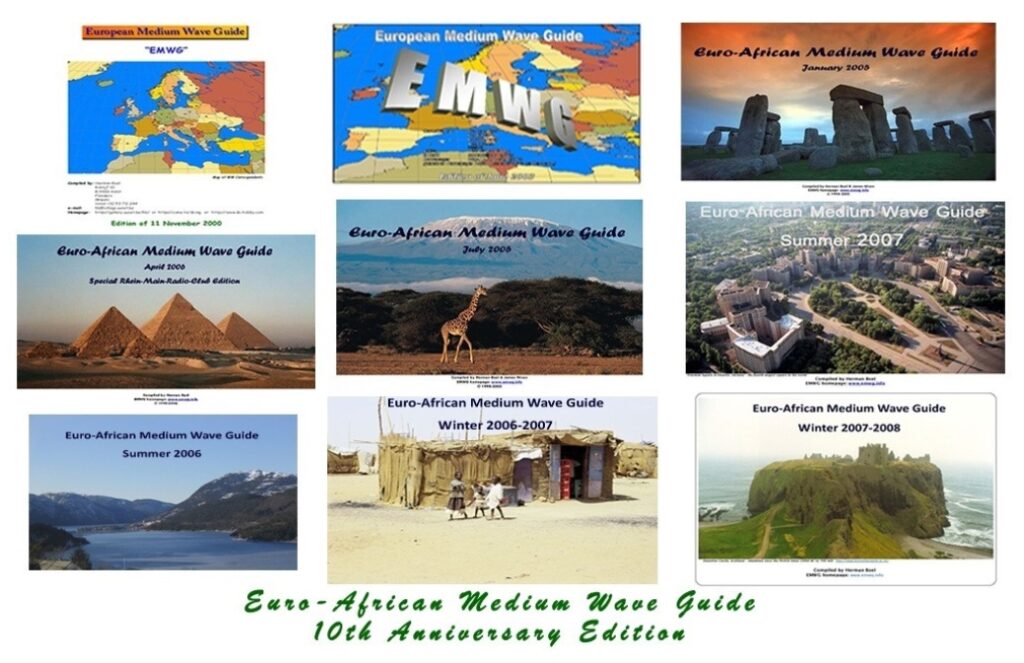The EMWG Archive
with Herman Boel
The European Medium Wave Guide (EMWG) was published by Herman Boel from 1998-2017. It was the most comprehensive directory of its kind.

As a teenager in the mid-80s, I used to play on my dad’s Tandy TRS-80 computer. I had a nice Toshiba radio set that I regularly tuned to BBC Radio 1 on 1053 kHz. I had always been a radio fanatic, taking along my medium wave radio on holiday to the south of France, much to the delight of the many other Flemish hotel guests who got to know all the football results from me on Monday morning (I listened to them on Sunday evening), rather than having to wait for Monday’s newspaper appearing on Tuesday.
Anyway, one winter afternoon I wanted to tune to the BBC but heard something weird instead: “Hier ist Radio Schweden International”. Huh? Sweden? In German? The next day I heard the same thing but in English, and they gave an address! So, I wrote a letter to the station and asked them one question: How on earth is it possible I could hear them in Belgium from such a large distance?
A week later they sent me a content rich yellow brochure, which I still have, giving an introduction to DXing and mentioning two DX clubs in my area. It was the official start of my DXing hobby.
20 years of information
Ten years later, in 1995, with electronic Bulletin Board Systems popping up, I not only already had an email address, but I could exchange information with other DXers. As I was not entirely happy with the medium wave information at hand at that time, I decided to make my own compilation.
1995 saw the introduction of the rather long named Long and Medium Wave Stations in Europe, North Africa and Middle East. It was not much different from what you could find in publications like the WRTH, but its uniqueness lied in the fact that all information was bundled together. You did not have to go from a frequency list to a country item to see when a station was broadcasting.
Originally, all times were in CET as this way I did not have to change almost all mentioned times twice a year. A huge time-saver!
Yet, the first edition of the EMWG did not get published until 1998.
The EMWG continued to be developed and by 2000 it was a publication in its right end. It had a large group of contributors that saw value in the publication and sent me information about stations in their area.
As from 2002, the information became more and more complete, and the publication could be consulted online.
Slowly but surely, I began to publish half-yearly editions, each year having a cover with a picture from a European or African location.
In December 2004, the EMWG was merged with James Niven’s African Medium Wave Guide and subsequently covered not only the whole of Europe and the Middle East, but the whole of Africa as well. It had become an indispensable tool for the medium wave DXer.
Although the guide was only published in PDF format once or twice a year, people could buy the PDF version for a very modest fee (€ 5) and got the PDF updated until the very day of publication. So, when you bought it in March, it was updated last in March, and one did not get a months old publication.
By 2016 I decided the number of changes on medium wave would increase so dramatically, keeping up would be a time-consuming nightmare. Think for instance about all the new, small LPAM stations popping up in the Netherlands.
The last edition therefore was published in 2017, 22 years after the publication of the first list.
Looking back at all those years, I can only conclude one thing and would like to use the words of Captain Kirk just before his big screen demise: “It was… fun!”.
The collection
The Circle is fortunate to have the full collection of EMWG available for members to download.
The EMWG Archive is only available to members of the Medium Wave Circle and is one of the many benefits of joining our community. All editions are available in the file storage area of the Medium Wave Circle’s online group (access button below).
If you are a Circle member and don’t yet have access to the online group please request access by sending us a message here.